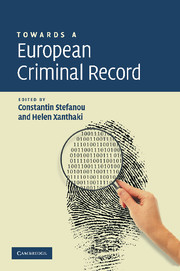Book contents
- Frontmatter
- Contents
- List of contributors
- Preface and acknowledgements
- 1 Introduction: How did the idea of a European Criminal Record come about?
- PART I
- PART II
- 5 The European Criminal Record in Austria
- 6 The European Criminal Record in the Czech Republic
- 7 The European Criminal Record in Germany
- 8 The European Criminal Record in Greece
- 9 The European Criminal Record in Hungary
- 10 The European Criminal Record in Ireland
- 11 The European Criminal Record in the Netherlands
- 12 The European Criminal Record in Slovenia
- 13 The European Criminal Record in Slovakia
- 14 The European Criminal Record in Spain
- 15 The European Criminal Record in England and Wales
- PART III
- 19 Conclusions
- Index
6 - The European Criminal Record in the Czech Republic
Published online by Cambridge University Press: 13 July 2009
- Frontmatter
- Contents
- List of contributors
- Preface and acknowledgements
- 1 Introduction: How did the idea of a European Criminal Record come about?
- PART I
- PART II
- 5 The European Criminal Record in Austria
- 6 The European Criminal Record in the Czech Republic
- 7 The European Criminal Record in Germany
- 8 The European Criminal Record in Greece
- 9 The European Criminal Record in Hungary
- 10 The European Criminal Record in Ireland
- 11 The European Criminal Record in the Netherlands
- 12 The European Criminal Record in Slovenia
- 13 The European Criminal Record in Slovakia
- 14 The European Criminal Record in Spain
- 15 The European Criminal Record in England and Wales
- PART III
- 19 Conclusions
- Index
Summary
Introduction
The Czech Republic has a central agency responsible for maintaining criminal records (criminal record attached to the Ministry of Justice) and uses a computerised system to store the register of convictions. There is no criminal responsibility of legal persons, and therefore the Czech criminal record contains only natural persons' data.
For the needs of Czech criminal proceedings the system is apparently sufficient. However, the Czech Republic's geographic position is in Central Europe and the country is – without any prejudice – characterised as a transit country for goods, services, people and perhaps more importantly criminals, criminal organisations and their illegal activities. The ‘foreign element’ is, therefore, presented in more and more criminal cases. Communications and exchanges of information between Member States are inevitable measures for the efficient fight against crime. Current methods (e.g. the 1959 European Convention on mutual assistance in criminal matters) seem to be insufficient and do not fulfil the needs of the EU because of the extensive impact from non-EU states. The practical application of the 1959 Convention embodies the following weaknesses:
all the parties to the Convention did not establish a record of convictions of foreign courts;
even for the parties that established a record of convictions it is usually ‘occasional practice’;
administration and deletion of data on convictions are subject to national modalities and needs;
information on non-EU states' citizens can be unavailable;
- Type
- Chapter
- Information
- Towards a European Criminal Record , pp. 138 - 153Publisher: Cambridge University PressPrint publication year: 2008



